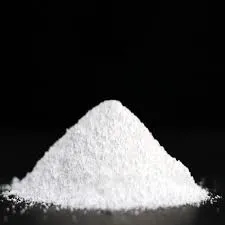Exploring the Benefits of PQQ A Powerful Bioactive Compound
Pyrroloquinoline quinone (PQQ) is a small quinone molecule that has gained significant attention in recent years due to its potential health benefits and bioactive properties. Originally discovered as a cofactor for certain bacterial enzymes, PQQ has since been recognized for its role in promoting cellular energy metabolism, protecting against oxidative stress, and influencing various aspects of human health. This article explores the benefits and mechanisms of action of PQQ, shedding light on why this compound is becoming a focal point of nutritional research.
The Role of PQQ in Cellular Energy Metabolism
One of the most significant functions of PQQ involves its ability to support mitochondrial health. Mitochondria, often referred to as the powerhouse of the cell, are responsible for producing adenosine triphosphate (ATP), the energy currency of the cell. PQQ has been shown to stimulate the growth of new mitochondria, a process known as mitochondrial biogenesis. This action is crucial for maintaining cellular energy levels, particularly in high-energy-demand organs such as the heart and brain.
Studies suggest that PQQ helps to enhance ATP production by promoting the function of key enzymes involved in cellular respiration. Additionally, it has been found to improve the overall energy metabolism in cells, providing a natural boost to physical and cognitive performance. For individuals facing fatigue or those seeking to enhance their athletic performance, incorporating PQQ into their diet could be a beneficial strategy.
Antioxidant Properties and Cellular Protection
Another compelling aspect of PQQ is its potent antioxidant properties. Oxidative stress, caused by an imbalance between free radicals and antioxidants in the body, has been implicated in various chronic diseases, including neurodegenerative disorders, cardiovascular diseases, and aging. PQQ's ability to scavenge free radicals and protect cells from oxidative damage makes it a valuable ally in promoting overall health and longevity.
Moreover, PQQ has been found to support the body’s natural antioxidant defenses by enhancing the expression of various antioxidant enzymes. This dual action — direct scavenging of free radicals and boosting the body’s own defense mechanisms — positions PQQ as a significant player in the prevention of age-related decline and chronic health issues.
pqq bio

Neuroprotective Effects
Emerging research indicates that PQQ may have neuroprotective effects, making it a promising compound for brain health. Animal studies have shown that PQQ can improve cognitive function and memory, likely through its role in mitochondrial health and its ability to reduce oxidative stress in neural tissues. Additionally, PQQ may support the synthesis of nerve growth factor (NGF), a protein essential for the survival and growth of neurons.
These effects are particularly relevant in the context of neurodegenerative diseases such as Alzheimer's and Parkinson's disease, where mitochondrial dysfunction and oxidative damage play significant roles. Although more research, particularly in human trials, is needed to fully understand the implications, the potential of PQQ as a neuroprotective agent is compelling.
Dietary Sources and Supplementation
While the human body can produce PQQ in small amounts, obtaining sufficient levels from dietary sources can be challenging. PQQ is found in various foods, including fermented soybeans, green peppers, kiwi, and spinach. However, the concentrations in these foods may not be adequate to achieve the desired health benefits.
As a result, PQQ supplementation has gained popularity. Available in supplement form, it allows individuals to increase their intake of this bioactive compound conveniently. When considering supplementation, it is essential to choose high-quality products from reputable manufacturers to ensure efficacy and safety.
Conclusion
PQQ is a bioactive compound with an impressive range of potential health benefits, particularly regarding mitochondrial function, antioxidant protection, and cognitive health. While research is still ongoing, the current evidence suggests that PQQ may play a vital role in optimizing cellular energy metabolism, protecting against oxidative stress, and supporting brain health. As further studies continue to unravel the complexities of PQQ, it may well emerge as a key player in the pursuit of enhanced wellness and longevity. Whether through dietary sources or supplements, integrating PQQ into a health-conscious lifestyle could prove to be a wise choice for many individuals seeking to support their overall health and vitality.

